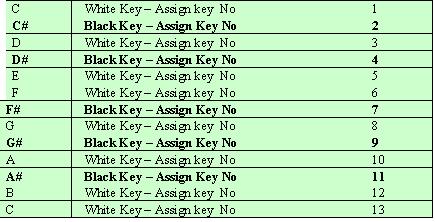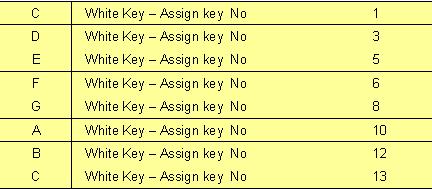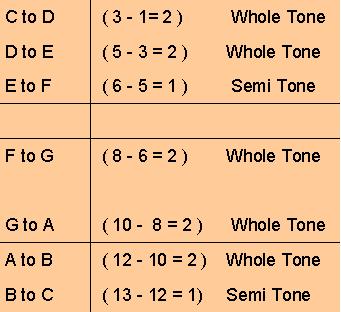Its straight simple Maths today !
Let us the assign each key a number from 1 to 12 for all the white and black keys in the order they are placed in a piano / keyboard, starting from Middle C for one octave ie upto next C, OK ?
Let us use the # symbol for the black keys, in between (usually they are called sharp of previous letter)

Considering our Major Scale, which we got introduced to in last discussion, which is pure white keys between C to C,
the key numbers for a Major Scale will be like this :

I think it is so simple for every one of you ! We have just omitted the black keys from the previous list and got the above list.
Now, one small relation ship we want to establish and analyse between two consecutive keys in the above Major Scale. For which, the following definition is presumed :
If the difference between the assigned numbers of the two adjacent key / notes of the major scale is ONE then the gap is called a Semitone.
If the difference is TWO then the gap is called Whole Tone.
With the above, analyse the gap between two adjacent notes of above Major Scale like this:

So let us define that,
A Major Scale shall have a gap pattern of adjacent notes as follows :
( Whole + Whole + Semi ) + Whole + ( Whole + Whole + Semi )
Let us the assign each key a number from 1 to 12 for all the white and black keys in the order they are placed in a piano / keyboard, starting from Middle C for one octave ie upto next C, OK ?
Let us use the # symbol for the black keys, in between (usually they are called sharp of previous letter)

Considering our Major Scale, which we got introduced to in last discussion, which is pure white keys between C to C,
the key numbers for a Major Scale will be like this :

I think it is so simple for every one of you ! We have just omitted the black keys from the previous list and got the above list.
Now, one small relation ship we want to establish and analyse between two consecutive keys in the above Major Scale. For which, the following definition is presumed :
If the difference between the assigned numbers of the two adjacent key / notes of the major scale is ONE then the gap is called a Semitone.
If the difference is TWO then the gap is called Whole Tone.
With the above, analyse the gap between two adjacent notes of above Major Scale like this:

So let us define that,
A Major Scale shall have a gap pattern of adjacent notes as follows :
( Whole + Whole + Semi ) + Whole + ( Whole + Whole + Semi )
No comments:
Post a Comment